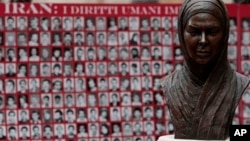GENEVA —
Iran is blasting the findings of a United Nations researcher who alleges an increase in torture, executions and repression of free expression in the country.
Citing many accusations of abuse in Iran, U.N. Special Investigator Ahmed Shaheed says he is concerned at the high rate of executions, the majority of them drug offenses, which do not meet international standards for “most serious crimes.”
According to Shaheed, about 500 executions took place in Iran last year, including some 200 secret executions acknowledged by family members, prison officials or members of the judiciary.
“My current report also presents what appears to be unimpeachable forensic evidence that torture is occurring in Iran on a geographically widespread and systemic basis, and that methods applied to victims are done so systematically, as similar methods re-appear in multiple testimonies submitted by individuals in cities across the country," he said.
Shaheed says the Iranian government continues to persecute religious minorities, and that 110 Baha’is and at least 13 Christians are currently being held in detention centers for exercising their faiths.
Iran’s delegate at the Human Rights Council, Ali Ardashir Larijani, blasted Shaheed’s findings, calling the report a compilation of unfounded allegations and accusations.
“The report ... is a product of an unhealthy, non-objective and counter-productive exercise initiated by the United States of America and its European allies," Larijani said. "Therefore, we never expected to receive and consider a balanced and impartial report out of hostile policies of these states.”
Officials in Tehran have refused to grant Shaheed access into the country.
Still, Shaheed acknowledged Iran has made some significant advances in the area of women’s rights. These include advancements in health, literacy and in enrollment rates of both the primary and secondary school levels.
However, Shaheed says, recent policies bar women from pursuing a number of fields of study. And women, he adds, are generally restricted in their freedom of movement and prevented from holding certain decision-making positions in the government.
“A majority of human rights defenders, including those that defend the rights of women, religious and ethnic minorities, as well as those that work to advance protections for the environment, workers and children, continue to be subjected to harassment, arrest, interrogation, and torture and are frequently charged with vaguely-defined national security crimes," he said.
Shaheed is the former foreign minister of the Maldives who was named the U.N.’s Iran monitor in 2011.
Citing many accusations of abuse in Iran, U.N. Special Investigator Ahmed Shaheed says he is concerned at the high rate of executions, the majority of them drug offenses, which do not meet international standards for “most serious crimes.”
According to Shaheed, about 500 executions took place in Iran last year, including some 200 secret executions acknowledged by family members, prison officials or members of the judiciary.
“My current report also presents what appears to be unimpeachable forensic evidence that torture is occurring in Iran on a geographically widespread and systemic basis, and that methods applied to victims are done so systematically, as similar methods re-appear in multiple testimonies submitted by individuals in cities across the country," he said.
Shaheed says the Iranian government continues to persecute religious minorities, and that 110 Baha’is and at least 13 Christians are currently being held in detention centers for exercising their faiths.
Iran’s delegate at the Human Rights Council, Ali Ardashir Larijani, blasted Shaheed’s findings, calling the report a compilation of unfounded allegations and accusations.
“The report ... is a product of an unhealthy, non-objective and counter-productive exercise initiated by the United States of America and its European allies," Larijani said. "Therefore, we never expected to receive and consider a balanced and impartial report out of hostile policies of these states.”
Officials in Tehran have refused to grant Shaheed access into the country.
Still, Shaheed acknowledged Iran has made some significant advances in the area of women’s rights. These include advancements in health, literacy and in enrollment rates of both the primary and secondary school levels.
However, Shaheed says, recent policies bar women from pursuing a number of fields of study. And women, he adds, are generally restricted in their freedom of movement and prevented from holding certain decision-making positions in the government.
“A majority of human rights defenders, including those that defend the rights of women, religious and ethnic minorities, as well as those that work to advance protections for the environment, workers and children, continue to be subjected to harassment, arrest, interrogation, and torture and are frequently charged with vaguely-defined national security crimes," he said.
Shaheed is the former foreign minister of the Maldives who was named the U.N.’s Iran monitor in 2011.












